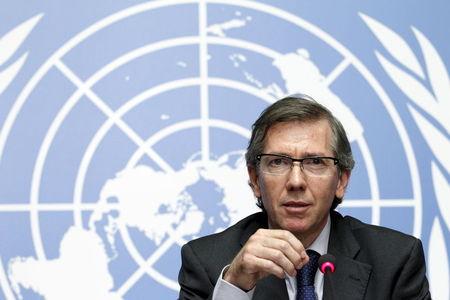Advertisement
Heavy clashes in Libya undermine U.N. peace talks
BENGHAZI, Libya/GENEVA (Reuters) - Islamic State fought separate battles with forces loyal to Libya's official government and with a rival group on Wednesday, as growing violence threatened to make U.N.-mediated peace efforts irrelevant.
Libya is in chaos as two governments and parliaments vie for power, while Islamic State and other armed groups exploit a security vacuum four years after the ousting of Muammar Gaddafi.
The United Nations brought the main warring factions together in Geneva this week. They agreed on Wednesday to end the crisis within weeks, the U.N. said in a statement.
But the diplomacy was sidelined by new fighting. Helicopters loyal to the internationally-recognized government based in eastern Libya bombed Islamic State positions in the central city of Sirte, said Ali al-Hassi, an air force spokesman.
Pictures posted on social media also showed eastern government forces, backed up by armed residents, firing artillery barrages at Islamic State positions on the outskirts of the eastern city of Derna.
The militant group launched an offensive this week to retake the city after a rival Islamist group had expelled it.
Libya's official government has been working out of the east since losing the capital Tripoli a year ago to a rival group which set up its own administration in the capital. The official government's forces have been also battling Islamists in Benghazi.
In separate violence, Islamic State clashed with a Salafist group near Sirte, residents said. The fighting started after the Salafists accused Islamic State of killing a Salafist preacher.
About 10 people were killed, said a hospital source. Information is hard to verify from the city, which is under control of Islamic State.
The U.N. put a brave face on the situation after two days of talks in Geneva. "The parties underscored their determination to conclude the dialogue process as soon as possible, with a target date within the coming three weeks," a U.N. statement said.
On Tuesday, U.N. Special Envoy Bernardino Leon called on the parties to agree on a unity government by the end of August and endorse it with a vote in September.
Mohamed Shoaib, head of the delegation representing the elected parliament based in the east, said he hoped the rival assembly in Tripoli, which rejected an initial deal last month, would now agree to a unity government.
"They have some reservations ... We say that we will deal with these points," he said.
(Additional reporting by Ulf Laessing and Cecile Mantovani; Editing by Andrew Roche)



















Add new comment